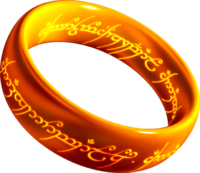- Dark fantasy
-
Fantasy Fantasy media
- Fantastic art
- Fantasy anime
- Fantasy art
- Fantasy artists
- Fantasy authors
- Fantasy comics
- Fantasy fiction magazine
- Fantasy films
- Fantasy literature
- Fantasy television
- Fantasy webcomics
Genre studies
- History of fantasy
- Fantastic
- Fantastique
- Fantasy tropes
and conventions - Fantasy races
- Fantasy worlds
- Legendary creatures
- Lovecraftianism
- Magician
- Magic
- Religious themes
- Tolkienology
Categories
- Fantasy
- Fantasy awards
- Fantasy subgenres
- Fantasy television
- Fantasy tropes
Dark fantasy is a term used to describe a fantasy story with a pronounced horror element.
Contents
Overview
A strict definition for dark fantasy is difficult to pin down. Gertrude Barrows Bennett has been called "the woman who invented dark fantasy".[1] Both Charles L. Grant[2] and Karl Edward Wagner[3] are credited with having coined the actual term "dark fantasy"—although both authors were describing different styles of fiction. Additionally, other authors, critics, and publishers have adopted dark fantasy to describe various other works. However, these stories rarely share universal similarities beyond supernatural occurrences and a dark, often brooding, tone. As a result, dark fantasy cannot be solidly connected to a defining set of tropes. The term itself may refer collectively to tales that are either horror-based or fantasy-based.
Horror-based
Charles L. Grant is often cited as having coined the term "dark fantasy". Grant defined his brand of dark fantasy as "a type of horror story in which humanity is threatened by forces beyond human understanding."[2] He often used dark fantasy as an alternative to horror, as horror was increasingly associated with more visceral works.
Dark fantasy is sometimes also used to describe stories told from a monster's point of view, or that present a more sympathetic view of supernatural beings usually associated with horror. Anne Rice's The Vampire Chronicles[4] and Chelsea Quinn Yarbro's Saint-Germain[5] cycle are early examples of this style of dark fantasy. This is in contrast to the traditional horror model, which focuses more on the victims and survivors.
In a more general sense, dark fantasy is occasionally used as a synonym for supernatural horror, to distinguish horror stories that contain elements of the supernatural from those that do not. For example, a story about a werewolf or vampire could be described as dark fantasy, while a story about a serial killer would simply be horror.[4]
Fantasy-based
Karl Edward Wagner is often credited for creating the term "dark fantasy" when used in a more fantasy-based context.[3] Wagner used it to describe his fiction about the Gothic warrior Kane. Since then, "dark fantasy" has sometimes been applied to sword & sorcery and high fantasy fiction that features anti-heroic or morally ambiguous protagonists. Another good example under this definition of dark fantasy is Michael Moorcock's saga of the albino swordsman Elric.[5]
Dark fantasy is occasionally used to describe fantasy works by authors that the public primarily associates with the horror genre. Examples of this would be Stephen King's The Dark Tower series,[5] Peter Straub's Shadowland,[6] and Clive Barker's Weaveworld.[5] Alternatively, dark fantasy is sometimes used for "darker" fiction written by authors best known for other styles of fantasy; Raymond Feist's Faerie Tale[6] and Charles de Lint's novels written as Samuel M. Key[7] would fit here.
See also
- Gothic fiction
- Horror fiction
- List of genres
- Occult detective
- Supernatural fiction
- Sword and sorcery
- Urban fantasy
- Weird fiction
References
- ^ "The Woman Who Invented Dark Fantasy" by Gary C. Hoppenstand from Nightmare and Other Tales of Dark Fantasy by Francis Stevens, University of Nebraska Press, 2004, page x. ISBN 0803292988.
- ^ a b The Greenwood Encyclopedia of Science Fiction and Fantasy: Themes, Works, and Wonders, Volume 1,edited by Gary Westfahl, Greenwood Publishing Group, 2005.
- ^ a b http://www.darkecho.com/darkecho/features/kew.html
- ^ a b http://www.nvcc.edu/home/ataormina/beyond/subjects/fantasysubgenres/darkfantasy.html
- ^ a b c d http://www.wrl.org/books-and-reading/adults/dark-fantasy
- ^ a b Clute, John and Grant, John. The Encyclopedia of Fantasy (2nd US edition). New York: St Martin's Griffin, 1999.
- ^ http://www.greenmanreview.com/book/book_delint_angelofdarkness.html
Horror fiction Media Subgenres Body · C-Horror · Comedy (list · Zombie comedy) · Dark fantasy · Dark romanticism · Ero guro · Erotic · Ghost · Gothic · J-Horror · K-Horror · Lovecraftian · Monsters (Frankenstein · Vampire · Werewolf) · Occult detective · Psychological · Religion (film) · Sci-fi (film) · Slasher (film) · Splatter/gore (film) · Supernatural · Survival · Weird menace · Weird West · Zombie apocalypse · Space GothRelated genres Others Categories:- Dark fantasy
- Fantasy genres
- Horror fiction
Wikimedia Foundation. 2010.

